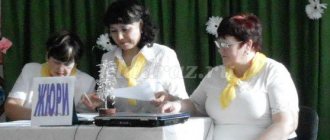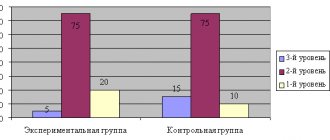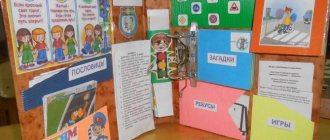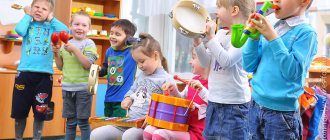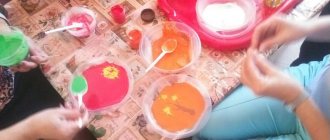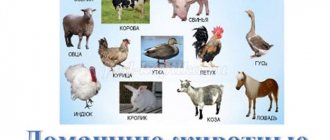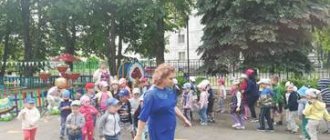Pedagogical council in the form of KVN in kindergarten. Abstract
Summary of the script of the pedagogical council “Theater is a serious matter!”
Author: Anufrieva Irina Viktorovna, senior teacher of the Children's Preschool Educational Institution "Kolokolchik" b. Dukhovnitskoye village, Saratov region.” Description of work: This publication will be useful to senior educators and methodologists of preschool educational institutions when organizing teacher councils (non-traditional forms). I advise you to hold such a teacher’s council in the form of KVN, believe me, it was so interesting and productive... Goal: Activation of the theoretical knowledge, practical skills and abilities available to kindergarten teachers on this topic (theatricalization in a preschool educational institution). Objectives: *Involve educators in the exchange and dissemination of personal experience. *Promote creativity and exploration. *Create a favorable psychological climate in the team.
Proceedings of the teachers' council: The music is playing “We are starting KVN”
1. Opening speech by the senior teacher “Theater is a serious matter” The whole life of children is full of play.
Every child wants to play their role in this game. Teaching a child to play, take on a role and act, while at the same time helping him gain life experience - theater helps to achieve all this. But there are no theaters in our village and therefore we must pay the closest attention to theatrical activities. I’ll repeat once again - “why?”... Initially, the topic of the teachers’ council was “Theatrical activities in the social and personal development of a preschooler.” Indeed, theatrical activities educate children socially, personally, emotionally and aesthetically. Since it allows you to form the experience of social behavior skills due to the fact that every fairy tale or literary work for preschool children always has a moral orientation (kindness, courage, friendship, etc.). Thanks to the theater, a child learns about the world not only with his mind, but also with his heart and expresses his own attitude towards good and evil. Theatrical activities help the child overcome timidity, self-doubt, and shyness. The kindergarten theater will teach the child to see the beautiful in life and in people, and will give rise to the desire to bring the beautiful and good into life. And my verdict from all that has been said: theater helps a child develop comprehensively. Therefore, I ask you, colleagues, do not forget about theatrical activities with children. But the success of your activities will depend on how much of an artist you are. And therefore, our today's teachers' council will take place in the form of KVN. KVN is humor, resourcefulness and intelligence, as well as artistry, musicality and communication! And in our case, it is also a club for those who love teaching and hope that our children will be happy. And the topic, contrary to the form of the teachers’ council, carries notes of seriousness and sounds “Theater is a serious matter!” This is how today they will unite - humor and seriousness, fun, joy and sadness, victory and loss...
Today in this hall two creative actors, two troupes, two teams will “cross weapons”... And as the KVN charter says, these weapons will be humor, resourcefulness and your artistry, which is an integral part of theatrical activity.
Please welcome the creative cast of actors called “Wise Owls”
.
The second theater troupe chose the name “Fight with Laziness”
.
I present to you the jury... So, we are starting KVN!.. And the Club meeting today will be held in our mini-theater, which has an improvised stage, actors and spectators all rolled into one, and theater critics (jury). What is it like in a theater without a director? (putting on the director's mantle). Let me be... I have no doubt that there will be applause here today and I hope that in the end you will be filled with positive emotions. I. Competition “Greetings for the opposing team” I deliberately did not give you this competition, as homework, to test today your imagination, creativity and, what is most important in our Club and profession, resourcefulness. You are given 1 minute to come up with an original, fun and perhaps unusual greeting. A minute passed... _________________________________________________ What talent, what skills should an actor have? (answers) Acting consists of many components: facial expressions, plasticity, stage speech, acting, the ability to dance, sing, improvise, get into character... II. Competition “Stage Speech” A bright voice, an expressive word, clear diction - all this should be possessed by a teacher involved in theatrical activities with children. Theatrical declamation is the art of delivering a speech expressively. You will now recite! But this competition will be complicated by the fact that you will be working with a prompter. The jury evaluates your ability to work with a prompter and the expressiveness of your stage speech. Two people from the team are called - an artist and a prompter. You are given the opportunity to choose which text you will advertise: poetry or prose... Texts in the application __________________________________________________________ An actor does not always need words to convey his feelings and thoughts to the viewer. He can do this with the help of gestures, facial expressions, and plasticity. This type of stage art, where characters express themselves without words, only through body language, is called... pantomime. III. Competition “Pantomime” One of the team members takes the “Kinder”, opens it, takes out the task and, using body language: gestures, facial expressions, plastic movements, depicts what is required. The opposing team must guess. Your pantomime will last 15 seconds. But you are given one minute to consult with the team on how to do this more interestingly... Tasks in the app _________________________________________________________ For an actor, it is very important to be able to put himself in the place of the hero whose role he got, and also to understand what he thinks, what he feels, then there is to get into character. IV. Competition “Reincarnation” (daisy) Now you have to transform into unusual characters. The fact is that these will be inanimate objects. Not only that, you have to imagine what they might think, feel and say to us. You pull out, read the task, and pronounce a monologue on behalf of the given object, and portray it, that is, you are completely transformed... You don’t name the object itself - the audience must guess what it is about. The winner is the one who best fits into the image he has been given, and who produces the most fun or original monologue. Your display lasts 15 – 20 seconds. Tasks in the application ______________________________________________________________ Everyone knows that in opera actors do not speak, but sing, and what they sing can be either poetry or prose. V. Competition “Musical Improvisation” Try yourself as a singer, using culinary recipes as a libretto. Don’t worry about your vocal abilities, this competition will not evaluate your vocal abilities, but your ability to improvise and your artistry. ________________________________________________ VI. Competition for captains “Fairytale blitz tournament” (“Question and answer”) The captain must answer 12 questions in a minute. You are given the right to choose questions. __________Tasks in Appendix _________ VII. Black Box Competition For this competition, each team prepared its own black box. Teams play against each other. “And the team is playing against you... Attention black box! _______________________________________ Teams prepare questions____________________ At any age, fairy tales can reveal something intimate and exciting. Listening to them in childhood, a person unconsciously accumulates a whole “bank of life situations”, so it is very important that the awareness of “fairy tale lessons” begins at an early age, with the answer to the question: “What does a fairy tale teach us?” VIII. Competition “An Old Fairy Tale in a New Way” (homework) And now the participating teams will show their abilities as screenwriters, costume designers, actors, sound engineers, and comedians. The topic of the homework is “An old fairy tale in a new way”, time limit – 5 minutes. Reflection: Cinquain (I remind you that a cinquain is a creative work that has a short form of a poem consisting of five unrhymed lines)
Theme of the cinquain: “Theatrical activities in kindergarten” 1 line - one noun expressing the main theme of the cinquain.
Line 2 – two adjectives expressing the main idea. Line 3 – three verbs describing actions within the topic. Line 4 is a phrase that carries a certain meaning. Line 5 – conclusion in the form of a noun (association with the first word). Instead of a conclusion... Our game, reminiscent of a mini-play, has come to an end.
I hope that today’s competition in the Cheerful and Resourceful Club became a fun and useful lesson for you, dear colleagues. Unfortunately, we very often forget that humor and jokes are effective methods in working with children. They create an atmosphere of ease and emotional intimacy. Please don’t forget about this, dear colleagues... Dear jury, a few words to the teams and, of course, the results. Rewarding. Thanks to all participants, jury, and spectators. Applications.
II. Competition “Stage Speech” Monologues are presented to choose from.
1. Monologue of Juliet (Capulet’s daughter), W. Shakespeare My face is saved by the darkness, Otherwise, you know, I would have burned with shame, That you have learned so much about me.
I would like to restore decency, But it’s too late, there’s no point in pretending. Do you love me? I know, I believe that you will say yes. But don't rush. After all, you will deceive. They say that Jupiter neglects the vows of love. Don't lie, Romeo. This is not a joke. Maybe I seem gullible? Well, okay, I’ll correct the impression and refuse you my hand, which I wouldn’t do voluntarily. 2. Monologue of Juliet (Capulet’s daughter), W. Shakespeare Romeo, how sorry I am that you are Romeo! Abandon your father and change your name, and if not, make me your wife, so that I won’t be a Capulet anymore. Only this name wishes me harm. You could be yourself without being a Montague. What is Montague? Is that the name of the Face and shoulders, legs, chest and arms? Are there really no other names? What does the name mean? A rose smells like a rose, Call it a rose or not. Romeo by any name would be the height of perfection that he is. Call me something else, Romeo, and then take all of me in return! A.P. Chekhov. “The Seagull”, Monologue of Nina Zarechnaya (final scene of farewell to Treplev). I'm so tired... I wish I could rest... I could rest! I am a seagull... No, that’s not it. I'm an actress. And he is here... He didn’t believe in the theater, he kept laughing at my dreams, and little by little I also stopped believing and lost heart... And here were the worries of love, jealousy, constant fear for the little one... I became petty, insignificant, I played senselessly... I I didn’t know what to do with my hands, I couldn’t stand on stage, I couldn’t control my voice. You don't understand this state when you feel like you're playing terribly. I am a seagull. No, that’s not it... Remember when you shot a seagull? A man came by chance, saw it and, having nothing to do, killed it... The plot for a short story... What am I talking about?.. I'm talking about the scene. Now I’m not like that... I’m already a real actress, I play with pleasure, with delight, I get drunk on stage and feel beautiful... A.N. Ostrovsky “The Thunderstorm”, Monologue of Katerina. Why don't people fly? Why don't people fly like birds? You know, sometimes I feel like I'm a bird. When you stand on a mountain, you feel the urge to fly. That's how she would run up, raise her hands and fly. Something to try now? Was that what I was like? I lived, didn’t worry about anything, like a bird in the wild. Mama doted on me, dressed me up like a doll, and didn’t force me to work; I used to do whatever I want. Do you know how I lived with girls? I'll tell you now. I used to get up early; If it’s summer, I’ll go to the spring, wash myself, bring some water with me and that’s it, I’ll water all the flowers in the house. I had many, many flowers. Then we’ll go to church with Mama, all the wanderers - our house was full of wanderers; yes praying mantis. And we’ll come from church, sit down to do some kind of work, more like gold velvet, and the wanderers will begin to tell us: where they were, what they saw, different lives, or sing poetry. So time will pass until lunch... III. Competition “Pantomime” One of the team members takes the “Kinder”, opens it, takes out the task and, using body language: gestures, facial expressions, plastic movements, depicts what is required. Your pantomime will last 15 seconds. But you are given one minute to consult with the team on how to do this more interestingly... Portray an athlete Cards with tasks to choose from, 5 tasks per team: * Hammer thrower * Tennis player * Hockey player * Figure skater * Graceful gymnast with a ribbon * Goalkeeper at the moment of an attack on his goal * Rider on a kicking horse * Distance swimmer * Jumper from a ten-meter platform * Epee fencer * Karateka IV. Competition “Transformation” (daisy) Cards with tasks to choose from, 3 tasks per team: * voice and act out what the shoes think when we put them on; * voice and act out what the bathroom mirror thinks when we look at it in the morning; * voice and act out what the sofa thinks when we sit on it or lie down; * voice and act out what the dishes think when we wash them; * voice and act out what a cell phone thinks when we talk on it; * voice and act out what the refrigerator thinks when we open it; V. Competition “Musical Improvisation” Musical recipe “Simple apple pie”
• Break three eggs into a bowl, add sugar and beat with a mixer until white foam.
• Then add flour and slaked soda and mix everything. • Cut the apples into slices and remove the core. • Grease a baking dish with butter, sprinkle with breadcrumbs and place apples on the bottom. Pour in the dough and bake for about 40 minutes at medium temperature. • The readiness of the pie can be checked with a toothpick or a match - the pie is ready when no dough sticks to the toothpick when it is immersed deep into the pie. Musical recipe “Hot sandwiches with sausage and cheese in the oven”
• Spread mayonnaise on 8 pieces of loaf prepared in advance.
• Cut the sausage (not very thick, but not thin semicircular slices and place on a loaf). • Cut the tomato (hard) into slices and place it on the loaf on top of the sausage. • Cut the cheese into slices and place on top. • Place everything on a baking sheet and place in an oven preheated to 150 degrees for 10–15 minutes. VI. Competition for captains “Fairytale blitz tournament” (“Question and answer”) 1 captain 1. Alexey Tolstoy retold an Italian fairy tale and called it... (“The Golden Key or the Adventures of Pinocchio”). 2. Where did the seventh kid hide? (In the oven). 3. A fairy tale about a bakery product (“Kolobok”). 4. What did Carlson love most? (Jam and cookies). 5. Name two fairy tales where swans are positive and negative characters? (“Wild Swans”, “Geese - Swans”). 6. Who defeated the Cockroach? (Sparrow). 7. A fairy tale about an old man who makes his living by fishing (“The Tale of the Fisherman and the Fish”). 8. What did the fairy make Cinderella’s carriage from? (From pumpkin). 9. The tale of three nickels, three hooks and twelve hooves (“The Three Little Pigs”) 10. What was Freken Bock’s position? (Housekeeper). 11. A fairy tale about a bird who, after a difficult childhood, still achieved universal recognition (“The Ugly Duckling”) 12. A fairy tale about an icy person of royal blood. ("The Snow Queen"). 2 captain 1. How did Thumbelina get to the land of the elves, on what? (On a swallow). 2. A fairy tale about a forest hostel (“Teremok”) 3. A fairy tale about a girl whose name was predetermined by a headdress (“Little Red Riding Hood”) 4. What word did Kai make out of ice floes? (Eternity). 5. In what fairy tale did a village family grow a giant vegetable? (“Turnip”). 6. The tallest hero of Sergei Mikhalkov? (Uncle Styopa). 7. Who are “Winged, Hairy, and Oily”? (Sparrow, mouse and pancake). 8. Which fairy tale contains a warning that you should not drink raw water? (“Sister Alyonushka and brother Ivanushka”). 9. A fairy tale about a boy who owes his birth not to his mother, but to his father (“Pinocchio”). 10. What were the names of the three little pigs? (Naf, Nif, Nuf) 11. In which fairy tale does the woman cry and the grandfather cry? (“Chicken Ryaba”) 12. Where did the woman get the flour for Kolobok? (I swept the barn with a broom and scraped the bottom of the tree.) HOMEWORK COMPETITION
We recommend watching:
Pedagogical council at the preschool educational institution. Environmental education Teachers' councils in preschool educational institutions Teachers' councils in preschool educational institutions with a presentation on the topic: Physical education and health work The use of health-saving technologies in preschool educational institutions in accordance with the Federal State Educational Standard
Similar articles:
Summary of the KVN economic game for older preschoolers
Installation teachers' council
Introductory teaching council “New academic year on the threshold of a preschool educational institution”
Target:
acquaintance of teachers with the results of the activities of the preschool educational institution for the summer period, adoption and approval of the activity plan of the preschool educational institution for the new academic year. To identify the level of professional preparedness of teachers, to develop cohesion, the ability to work in a team, and to defend their point of view with reason.
Form:
a business meeting.
Agenda:
1. Report on repair work. Rep. Manager
2. Analysis of summer health work with children. Rep. senior teacher
3. Approval of the annual plan for the 2021 – 2021 academic year. Rep. senior teacher
4. Approval of the GCD and circle work grid, daily routine, curriculum, programs, long-term planning of specialists and circle work, projects. Rep. senior teacher
5. Miscellaneous.
Greeting. Congratulations.
Dear Colleagues! I am very pleased to welcome you in full force to the first teachers’ meeting. And also allow me to congratulate you on the beginning of a new, interesting, fruitful academic year!
Congratulate the new junior group, teachers Polyanichkina Yu.Yu. Welcome back to our team, N.N. Yakovlev with the replenishment of the ranks of teachers, Kovalev A.I. with transfer to the position of speech therapist teacher. We look forward to fruitful work with you.
Today's teachers' meeting will be held in the form of a business game, the purpose of which will be not only to get acquainted with the annual plan, but also to improve the skills of teachers. Today we have the opportunity not only to learn about the activities of our colleagues, but also to systematize knowledge and comprehend our own approaches to work.
1.
Report on repair work.
2.
Analysis of summer - recreational work.
Analytical report on the results of summer health work
Summer health work was carried out in the Toguchinsky district MKDOU “Toguchinsky kindergarten No. 7” according to the annual plan.
During the summer period there were 3 age groups.
The summer health work plan was developed on the basis of federal state requirements (FSES) for the structure of the basic general education program of preschool education.
The content of the pedagogical process was carried out in the joint activities of adults and children, independent activities of children, as well as during routine moments. The main form of working with children was play.
The program of events was built on a comprehensive thematic principle within the framework of the integration of all educational areas, which ensured the solution of the problems of the summer period, taking into account the main directions of child development in accordance with the Federal State Educational Standard for Education:
physical development,
social and communicative development,
cognitive development,
speech development,
-artistic and aesthetic development.
During the reporting period, the activities of the teaching staff were aimed at solving the following tasks:
With kids:
Create conditions for strengthening the health and physical development of children, increasing the effectiveness of hardening activities, improving an individual differentiated approach to physical education.
Provide conditions for protecting the life and health of children and preventing injuries.
Promote the formation of healthy lifestyle habits and safe behavior skills.
To develop curiosity, cognitive and creative activity by including preschoolers in elementary search, visual, motor and musical activities.
With employees:
Creating comfortable conditions for optimizing the motor, cognitive-speech, labor, intellectual, artistic, aesthetic and other types of activity of each child.
Organization of a health-preserving regime, ensuring the protection of the life and health of children, preventing morbidity and injury.
Implementation of a system of measures aimed at the health and physical development of children, their moral education, the development of curiosity and cognitive activity, speech development, the formation of cultural, hygienic and labor skills.
With parents:
Increasing the competence of parents in organizing summer holidays.
Involving families in the educational process based on collaborative pedagogy.
Expected results:
Increasing the functional capabilities of the body.
Reducing morbidity and introducing children to a healthy lifestyle.
Enriching children's knowledge, increasing their interest in the world around them, creativity, and knowledge.
Increasing the number of parents participating in the educational process of preschool educational institutions.
In order to ensure the efficiency of the preschool educational institution's work, together with the parents of the pupils in the summer, the territory of the preschool educational institution was improved: areas for groups were equipped, small forms and fences were painted, sand was brought in, and a “health path” was created for barefoot walking. To increase the level of awareness of parents, individual consultations and conversations were held on all questions that parents had.
In the course of implementing the task of preserving and strengthening the health of children, the following work was carried out:
Particular attention was paid to the nutrition and drinking regime of pupils in the summer; the nutrition was balanced, taking into account compliance with food consumption and calorie standards.
Food was distributed according to the diet plan drawn up for the summer recovery period. The hygiene of food intake in the group and the aesthetics of catering were regularly monitored.
To achieve a health-improving effect in the summer, the daily routine provided for the maximum stay of children in the fresh air, taking into account the even distribution of physical activity in the first and second half of the day, as well as the temperature regime. One of the components of a rationally constructed daily regimen was outdoor walks, which increase children’s motor activity by including running exercises, the use of outdoor games of various activities, relay races, elements of sports games, walking and excursions.
Conditions were created to increase the motor activity of preschool children by expanding the range of outdoor sports equipment.
During the summer, the administration of the preschool educational institution carried out operational control over the fulfillment of SanPiN requirements for the organization of physical education and recreational work (morning reception, morning exercises, exercises after sleep, hardening, physical education classes, holidays, entertainment).
Over the summer period, various events with children and quest games were held.
| 01.06.18 | Holiday "Children's Day" | Educators Volokhataya N.M. Sosenko E.N. |
| 09.06.18 | "Russia Day" | Educator Bubenkova A.V. Musical director Sumskaya A.N. |
| 15.06.18 | "Sports relay" | Educator Kondratyeva G.A. |
| 22.06.18 | Tourist leisure "Cheerful tourists" | Educator Sosenko E.N. |
| 29.06.18 | "Fairytale Quiz" | Educator Bortsova S.V. |
| 06.07.18 | "Adventures in the Land of Traffic Lights" | Educational psychologist Ishchenko E.N.. |
| 25.08.18 | "Russian Fair" | Educator Protopopova T.N. |
| 31.08.18 | "Goodbye, Summer!" | Educator Volokhataya N.M. |
I would like to note the work of the teachers of the senior group Sosenko E.N. and Volokhatuy N.M., junior group Bubenkova A.V. During the summer recreational period, they always organized exhibitions of drawings and crafts. Many thanks to these teachers for the photo reports.
Slideshow “Here it is, what our summer is like.
Based on the above, we can assume that the summer health campaign at the preschool educational institution was held at a fairly high level. The teaching staff implemented the planned tasks in full.
3.
Objectives for the 2018-2019 academic year.
Taking into account the achieved results and the main problems faced by kindergarten employees in 2017-2018, work prospects for the next academic year were determined:
Development of human resources potential of an educational organization in the context of the implementation of a professional standard.
Organization of social partnership of preschool educational institutions with organizations and institutions in the context of the implementation of the Federal State Educational Standard for preschool educational institutions based on a model of network interaction.
Development and implementation of a network project as part of the implementation of the objectives of the educational program of the Institution;
Certification of teachers for the first and highest qualification categories in accordance with the certification schedule;
Development and implementation of work programs for each age group;
Continuation of work to preserve and strengthen health, prevent and correct the physiological qualities of pupils;
Continuation of work to enrich the subject-development environment in the Institution in accordance with the requirements of the Federal State Educational Standard for Educational Education.
Target:
creation of an educational space aimed at the child’s continuous accumulation of cultural experience of activity and communication in the process of active interaction with the environment, communication with other children and adults when solving problems of communicative-personal, cognitive, speech, artistic, aesthetic and physical development in accordance with age and individual characteristics.
Methodological topic:
“Development of human resources potential of an educational organization in the context of the implementation of a professional standard.
Objectives for the 2021 – 2021 academic year:
Continue work to preserve and strengthen the health of preschool children by increasing the role of parents in the health of children and introducing them to a healthy lifestyle.
Systematize and summarize the work of teachers in organizing educational activities with children in the context of the implementation of the Federal State Educational Standard; using ICT technologies:
To improve psychological and pedagogical work on children’s mastery of the educational field “Speech Development” through the integration of educational fields, as well as the development of speech and verbal communication of children through works of fiction.
Continue to create an enriched developmental spatial environment in accordance with the Federal State Educational Standard for Educational Education, which promotes the development of social and psychological qualities of a preschooler’s personality in various types of activities.
To increase the level of professional competence of teachers in the field of organizing interaction with parents of students, paying special attention to studying the problems of raising a child in a family and involving the family in a single educational space.
To promote the formation of professional competence of kindergarten teachers: in the context of the introduction of the Professional Standard for Teachers
Taking advanced training courses for teachers
In accordance with the schedule for taking advanced training courses for teachers of the MKDOU Toguchinsky district “Toguchinsky kindergarten No. 7” for the 2021 – 2021 academic year, advanced courses must be completed by Sosenko E.N. (application approved by the UO), Ishchenko E.N., Yakovleva N.N., Smerteva A.S.
Improving the qualifications and professional skills of teachers
In accordance with the certification schedule for teachers of the MKDOU Toguchinsky district “Toguchinsky kindergarten No. 7” for the 2021 – 2019 academic year, documents have now been submitted by Volokhata N.M. to the highest category, Bortsova S.V. - to the first category. It is necessary to prepare documents for the certification of Smerteva A.S., Kovaleva A.I. for the 2021–2021 academic year. It is advisable to be certified ahead of schedule by Ivanova S.A., Sosenko E.N., Bubenkova A.V., Kondratyeva G.A. to the highest category.
Plan of events with the teaching staff
Plan of activities with children and parents (annual plan)
SLIDE GAME
“PEDAGOGICAL RING” I ask questions to each team in turn and the one that gave the correct answer gets a chip.
Who is the family in the education system? (Participants)
The child began to behave aggressively with peers (fights, bites), and does not participate in non-social activities. How and when will you inform your parents about this? ( In an individual conversation, in the evening).
Parents are the first teachers. They are obliged to lay the foundations for the physical, moral and intellectual development of the child in early childhood. Which regulatory document contains this statement? (Article 18 “Law on Education” of the Russian Federation).
In which case is it recommended to reduce the duration of the walk? (When the air temperature is below minus 15 C and the wind speed is more than 7 m/s).
Name the duration of continuous direct educational activities for preschool children. (For children from 3 to 4 years old - no more than 15 minutes, for children from 4 to 5 years old - no more than 20 minutes, for children from 5 to 6 years old - no more than 25 minutes, and for children from 6 to 7 years old - no more than 30 minutes).
Name the educational areas of the program. (Socio-communicative development, cognitive, speech, physical, artistic and aesthetic).
What should a teacher know when going on an excursion with children? (Exact number of children, route).
Tell the teacher what to do if a child gets injured. ( Provide first aid, inform the nurse, manager. If necessary, take the child to the nearest clinic).
On the basis of what document is an approximate basic general education program for preschool education being developed? (FSES)
What should be the subject-development environment in a group room? ( Content-rich, transformable, semi-functional, variable, accessible, safe).
Within the framework of this approach to conducting educational activities, children consider this or that phenomenon or event from different sides, highlighting and studying different aspects. What approach to GCD are we talking about ?
(integrated)
Daily routine
Schedule of educational activities for the 2021 – 2019 academic year
Work schedule of preschool teaching staff
Discussing the decision of the teachers' council and making proposals
Development of a decision of the teachers' council
I propose to complete the work of our pedagogical council by making decisions. The floor for reading the draft decision is given to __________
1. Work during the summer recovery period is considered satisfactory. Make a photo report - an exhibition about summer events.
(Term until 09.09.2016, responsible Smerteva A.S., Bortsova S.V.)
Approve the list of changes in the educational program of the preschool educational institution, the schedule of educational activities, the work schedule of narrow specialists for the 2021–2019 school year. year. (Acting head A.S. Smerteva, 08/31/2018)
Bring working documentation into compliance with approved documents. (Deadline until 09/07/2018)
Adopt the annual work plan of the preschool educational institution for the 2021 – 2021 academic year. year. (During the year, all preschool teachers)
What will be the opinions on the draft decision? What changes and proposals will there be? A proposal was made to adopt the draft decision as a basis.
VOTE
Final word
We have a whole academic year ahead of us – a period of interesting work, communication with children, parents and colleagues. To solve professional problems, we need not only to have professional knowledge and skills, but also to be wise. These autumn leaves contain statements and aphorisms about raising children.
Voice them and let's create a tree of pedagogical wisdom. Let these words become a kind of motto for us for the new school year.
A game. " Tree of Wishes " with teachers
Goal: get an answer to the question “Are you ready to cooperate?”
Material: a birch tree trunk with branches is drawn on a sheet of whatman paper; yellow paper slips (according to the number of participants); glue or pieces of double-sided tape. Whatman paper is attached to the wall, and leaves of paper lie on the table nearby.
Instructions. Autumn. Nature is transforming. Birch put on her golden outfit. If you are ready to cooperate in the new school year, if your answer is “yes,” then glue a yellow piece of paper to any branch, if the answer is “no,” then to the foot of the birch tree.
Processing: The result is visible to everyone immediately. The autumn birch tree has either a lush golden crown or a rich carpet at the foot.
Non-traditional pedagogical council as an innovative mechanism of collegial management
Evgenia Vladimirovna Voronina, Candidate of Pedagogical Sciences, Associate Professor of the Department of Pedagogy and Psychology, Ishim Pedagogical Institute named after. P.P. Ershova" branch of Tyumen State University, Ishim [email protected] Natalya Vladimirovna Severnyuk, Deputy Director of MAOU Secondary School No. 8, Ishim [email protected]
Starokorova Olga Yuryevna, Deputy Director of MAOU Secondary School No. 8, Ishim [email protected]
Non-traditional pedagogical council as an innovative mechanism of collegial management
Annotation. The article describes the structure and content of a non-traditional pedagogical council in the form of a discussion platform. One of the pressing problems requiring management decisions is the problem of adaptation of young specialists. The article is addressed to school administrations, teachers-mentors, and young specialists. Key words: non-traditional form of pedagogical council, young specialist, development of professional identity.
Modern pedagogical practice is increasingly turning to non-traditional forms of holding pedagogical councils, which are turning into an innovative mechanism for collegial management of an educational organization. The modern teachers' council is a source of pedagogical ideas, a generator of non-standard management decisions leading to a positive result. To overcome formalism in the work of the pedagogical council, increase the interest of workers and the effectiveness of activities, organize creative activities in a team of like-minded people - these are the specific tasks of the pedagogical council as a governing body. The forms of conducting the pedagogical council are quite diverse. Most often they are divided into three groups: • traditional – built on the basis of reports in compliance with a standard organizational scheme for discussing issues; • intensified – based on the work of problem groups with partial compliance with a standard organizational scheme for discussing issues; • non-traditional – based on a non-standard organizational scheme for discussing issues [ 1]. The pedagogical council discussion assumes that the majority of teachers will express their opinion on some issue and get acquainted with the opinions of their colleagues. We have developed and tested the pedagogical council discussion platform “Development of professional competence of young specialists”. Purpose: to identify the main reasons for the low adaptation of young specialists at school , determine further directions for designing the professional development of a young teacher and improving the quality of his teaching activities.
At the first stage, a message is presented on the topical issue of adaptation of young specialists and the results of a survey of young teachers. At the end of the presentations, pedagogical problems were updated to organize the discussion. The next stage is to discuss the proposed problems at a round table. Participants are placed in groups at round tables for collective work on the presented problem. Signs with the problem are placed on each table and sheets with the task are given. Direction 1: Young specialist
children's team: how to withstand the test of strength? Difficulties in communicating with students How to withstand the test of strength? 2nd direction: Teacher and Parents: wall of misunderstanding or constructive dialogue?
Difficulties in communicating with parentsForms of work, ways of interacting with parents
Direction 3: Mentoring school: pros and cons? Difficulties in organizing mentoring at school How to help a teacher? How to organize not formal mentoring, but productive work?
Direction 4: Young specialist in the teaching community: one among his own? Difficulties in communicating with the administration, colleagues Forms of work, ways of interacting with colleagues
After discussing the problems, exercises from psychological training were carried out, which, according to E.V. Voronina, is “one of the most effective conditions for the formation of professional identity” [2]. In conclusion, the results of the pedagogical council are summed up and the general opinion on the issues considered is voiced. A reflective analysis of the results of the pedagogical council allows us to state that holding a pedagogical council in a non-traditional form is advisable; a positive impact on the psychological state of teachers and satisfaction with the activities of the pedagogical council was noted. The target component of the event was implemented, the assigned tasks were solved. Further actions will be aimed at implementing collectively adopted management decisions.
Links to sources 1. Savina N.M. Forms of conducting pedagogical councils // Directory of the deputy director of the school. 2010. No. 8.URL: https:// www.menobr.ru/materials/370/ 5397/2. Voronina E. V., Eltsova A. A. Psychological and pedagogical conditions of formation professional identity of students // Concept. –2015. –No. 05 (May). –ART 15168.–URL: https://ekoncept.ru/2015/15168.htm. –ISSN 2304120X.
